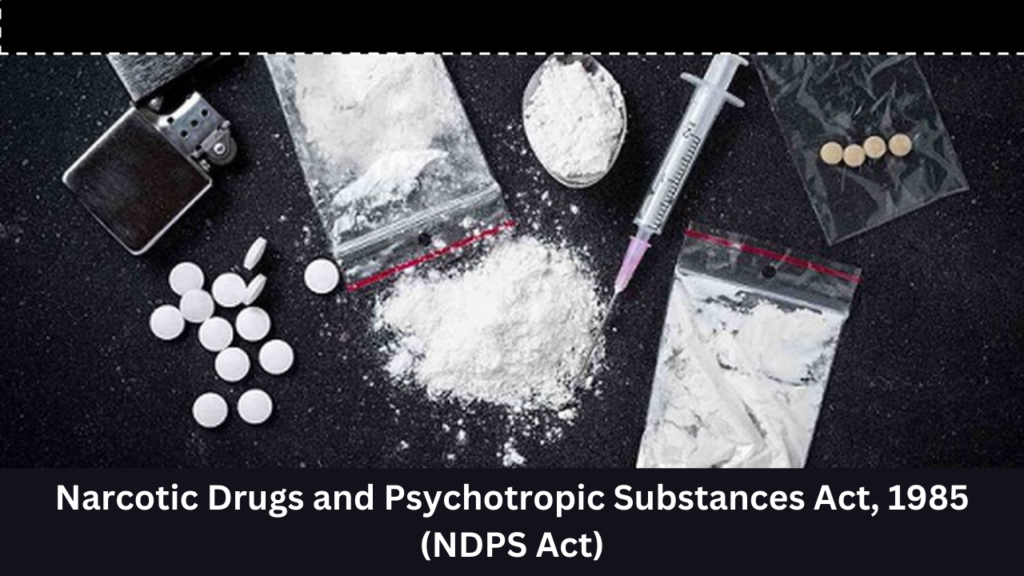The Narcotic Drugs and Psychotropic Substances Act, 1985 (NDPS Act) is a crucial legislation in India aimed at combating the menace of illicit trafficking and abuse of narcotic drugs and psychotropic substances. While this Act provides law enforcement agencies with necessary tools to curb drug-related offenses, it’s equally important to ensure that the legal rights of individuals are protected during the process of arrest, search, and seizure under this Act. This article delves into the legal rights afforded to individuals and the procedural safeguards mandated by the NDPS Act during arrest, search, and seizure.

Legal Rights of an Individual
The Constitution of India guarantees certain fundamental rights to its citizens, including those accused of criminal offences. These rights are essential safeguards to prevent abuse of power by law enforcement agencies and to ensure fair and just treatment of individuals. Some of the key legal rights of an individual under the NDPS Act include:
- Right to Legal Representation: Upon arrest, an individual has the right to be informed of their right to legal representation. They also have the right to consult and be defended by a legal practitioner of their choice. This ensures that the accused receives proper legal counsel and representation throughout the legal proceedings.
- Right to be Informed of Charges: The NDPS Act mandates that a person arrested for a drug-related offense must be informed of the grounds of arrest and the specific charges against them. This prevents arbitrary detention and ensures transparency in the legal process.
- Right to Bail: Like any other criminal offense, a person accused under the NDPS Act has the right to apply for bail. However, bail may be granted or denied based on various factors, including the seriousness of the offense, the likelihood of the accused fleeing justice, and the potential threat posed by releasing the accused on bail.
- Right Against Self-Incrimination: The right against self-incrimination protects individuals from being compelled to testify against themselves. Under the NDPS Act, an accused person cannot be forced to confess to the offense they are charged with. Any confession made to a police officer is not admissible as evidence unless it is made in the presence of a Magistrate.
- Right to Fair Trial: Every individual accused of a drug-related offense has the right to a fair trial. This includes the right to a speedy trial, the right to present evidence and witnesses in their defense, and the right to cross-examine witnesses presented by the prosecution.
Arrest, Search, and Seizure Process Under the NDPS Act
The NDPS Act provides specific procedures to be followed by law enforcement agencies during the arrest, search, and seizure of narcotic drugs and psychotropic substances. These procedures are designed to balance the need for effective law enforcement with the protection of individual rights. Some of the key provisions regarding arrest, search, and seizure under the NDPS Act are as follows:
- Arrest: Under Section 41 of the NDPS Act, a police officer not below the rank of a Sub-Inspector is empowered to arrest a person without a warrant if they have reasonable grounds to believe that the person has committed an offense under the Act. However, the arrested person must be produced before a Magistrate within 24 hours of arrest, excluding the time necessary for the journey from the place of arrest to the Magistrate’s court.
- Search: Section 42 of the NDPS Act provides for the search of persons, vehicles, and premises suspected of containing narcotic drugs or psychotropic substances. A police officer not below the rank of a Sub-Inspector can conduct such searches if they have reason to believe that narcotics are present. However, the search must be conducted in the presence of two or more independent witnesses, and a list of all articles seized during the search must be prepared and signed by the witnesses.
- Seizure: Any narcotic drugs, psychotropic substances, or controlled substances found during the search can be seized by the police officer. The seized items must be properly inventoried, sealed, and sent for chemical analysis to confirm their composition and potency. The procedures for seizure are outlined in Section 52 of the NDPS Act.
- Safeguards: While carrying out arrests, searches, and seizures under the NDPS Act, law enforcement agencies must adhere to certain safeguards to prevent abuse of power and protect the rights of individuals. These safeguards include ensuring the presence of independent witnesses during searches, maintaining proper documentation of all actions taken, and handling seized substances in accordance with prescribed procedures.
Conclusion
The NDPS Act of 1985 plays a crucial role in combating the illicit trafficking and abuse of narcotic drugs and psychotropic substances in India. However, it’s essential to uphold the legal rights of individuals during the process of arrest, search, and seizure under this Act. By ensuring transparency, fairness, and adherence to legal procedures, law enforcement agencies can effectively combat drug-related offenses while upholding the principles of justice and individual rights. It is imperative for both law enforcement agencies and individuals to be aware of these legal rights and procedural safeguards to ensure a just and equitable enforcement of the NDPS Act.
Adv. Khanak Sharma
